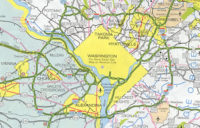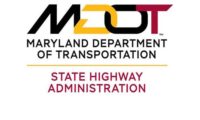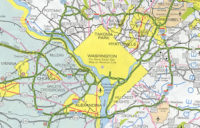Maryland’s proposal to widen portions of the I-495 Capital Beltway and I-270 near Washington, D.C. under a $6-billion progressive public-private partnership has been approved by the Federal Highway Administration. The project, proposed five years ago by Gov. Larry Hogan (R), is set to add tolled express lanes to some of the National Capital region’s most congested highways.
Under the agency's Aug. 25 Record of Decision, Maryland can now finalize a 50-year contract to design, build and manage the express lanes with Accelerate Maryland Partners—a team led by Transurban (USA) Operations Inc., and Macquarie Infrastructure Developments LLC, that was selected in early 2021 to manage the project’s development phase.
Over the past year, the Transurban-Macquarie team has been developing preliminary designs to add four toll lanes, two in each direction, to the I-495/Capital Beltway between the Virginia border and the I-270 spur, and on I-270 between the Beltway and I-370. Totaling 12 miles, the project also replaces the Beltway section’s 60-year-old Potomac River crossing with a new bridge that will provide a seamless connection to Virginia’s express lanes system.
From the outset, the proposed express lanes have been heavily criticized by opponents who cite potential detrimental effects on adjacent densely developed neighborhoods and the environment. The Maryland Dept. of Transportation and Accelerate Maryland Partners have vowed to mitigate all legitimate concerns, plus provide millions of dollars in funding to implement high-priority transit projects in the area.
In addition to reviewing more than 5,000 public comments included with the project’s final environmental impact statement, published in June, FHWA engaged the U.S. Dept. of Transportation’s Volpe National Transportation Systems Center to review allegations of flaws in the state’s traffic modeling analysis to justify constructing the express lanes.
According to a MDOT statement, the Volpe Center review “did not find ‘scientific integrity fraud in the Toll Lane Traffic Model.’”
Maryland’s three-member Board of Public Works is expected to approve a design and construction agreement with Accelerate Maryland Partners in the next few months, but the project could still face multiple hurdles. They include a five-month window for legal challenges to the FHWA decision, and a long-running bid protest by a Cintra-led team claiming irregularities in the selection process for the development phase contract.
MDOT rejected a circuit-court-ordered reassessment of Cintra’s protest in May, but the company has a separate legal challenge pending in Maryland’s Court of Appeals.






Post a comment to this article
Report Abusive Comment